最新中职英语基础模块教案:Unit6英语 (2)
- 格式:doc
- 大小:20.00 KB
- 文档页数:3
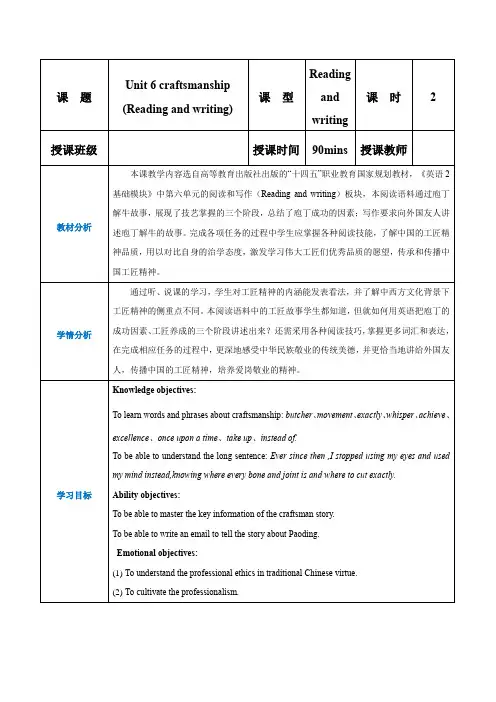
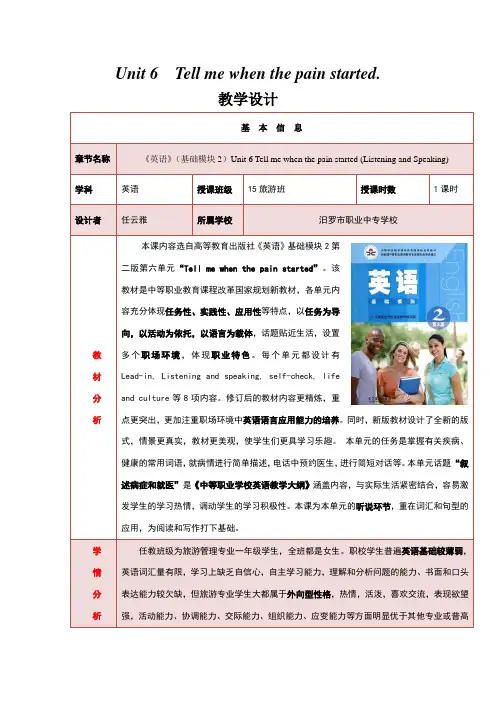
Unit 6 Tell me when the pain started.教学设计基本信息章节名称《英语》(基础模块2)Unit 6 Tell me when the pain started (Listening and Speaking) 学科英语授课班级15旅游班授课时数1课时设计者任云雅所属学校汨罗市职业中专学校教材分析本课内容选自高等教育出版社《英语》基础模块2第二版第六单元“Tell me when the pain started”。
该教材是中等职业教育课程改革国家规划新教材,各单元内容充分体现任务性、实践性、应用性等特点,以任务为导向,以活动为依托,以语言为载体,话题贴近生活,设置多个职场环境,体现职业特色。
每个单元都设计有Lead-in, Listening and speaking, self-check, lifeand culture等8项内容。
修订后的教材内容更精炼,重点更突出,更加注重职场环境中英语语言应用能力的培养。
同时,新版教材设计了全新的版式,情景更真实,教材更美观,使学生们更具学习乐趣。
本单元的任务是掌握有关疾病、健康的常用词语,就病情进行简单描述,电话中预约医生,进行简短对话等。
本单元话题“叙述病症和就医”是《中等职业学校英语教学大纲》涵盖内容,与实际生活紧密结合,容易激发学生的学习热情,调动学生的学习积极性。
本课为本单元的听说环节,重在词汇和句型的应用,为阅读和写作打下基础。
学情分析任教班级为旅游管理专业一年级学生,全班都是女生。
职校学生普遍英语基础较薄弱,英语词汇量有限,学习上缺乏自信心,自主学习能力,理解和分析问题的能力、书面和口头表达能力较欠缺,但旅游专业学生大都属于外向型性格,热情,活泼,喜欢交流,表现欲望强,活动能力、协调能力、交际能力、组织能力、应变能力等方面明显优于其他专业或普高学生,在英语课堂上对感兴趣的活动会积极参与。
另外,班级还有半数学生为对口高考生,学习目标明确,基础较好。
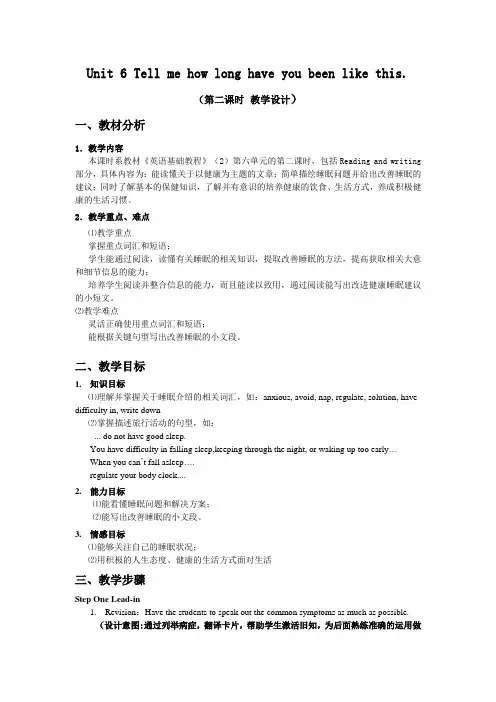
Unit 6 Tell me how long have you been like this.(第二课时教学设计)一、教材分析1.教学内容本课时系教材《英语基础教程》(2)第六单元的第二课时,包括Reading and writing 部分,具体内容为:能读懂关于以健康为主题的文章;简单描绘睡眠问题并给出改善睡眠的建议;同时了解基本的保健知识,了解并有意识的培养健康的饮食、生活方式,养成积极健康的生活习惯。
2.教学重点、难点⑴教学重点掌握重点词汇和短语;学生能通过阅读,读懂有关睡眠的相关知识,提取改善睡眠的方法,提高获取相关大意和细节信息的能力;培养学生阅读并整合信息的能力,而且能读以致用,通过阅读能写出改进健康睡眠建议的小短文。
⑵教学难点灵活正确使用重点词汇和短语;能根据关键句型写出改善睡眠的小文段。
二、教学目标1.知识目标⑴理解并掌握关于睡眠介绍的相关词汇,如:anxious, avoid, nap, regulate, solution, have difficulty in, write down⑵掌握描述旅行活动的句型,如:... do not have good sleep.You have difficulty in falling sleep,keeping through the night, or waking up too early…When you can’t fall asleep….regulate your body clock....2.能力目标⑴能看懂睡眠问题和解决方案;⑵能写出改善睡眠的小文段。
3.情感目标⑴能够关注自己的睡眠状况;⑵用积极的人生态度、健康的生活方式面对生活三、教学步骤Step One Lead-in1.Revision:Have the students to speak out the common symptoms as much as possible.(设计意图:通过列举病症,翻译卡片,帮助学生激活旧知,为后面熟练准确的运用做好准备。
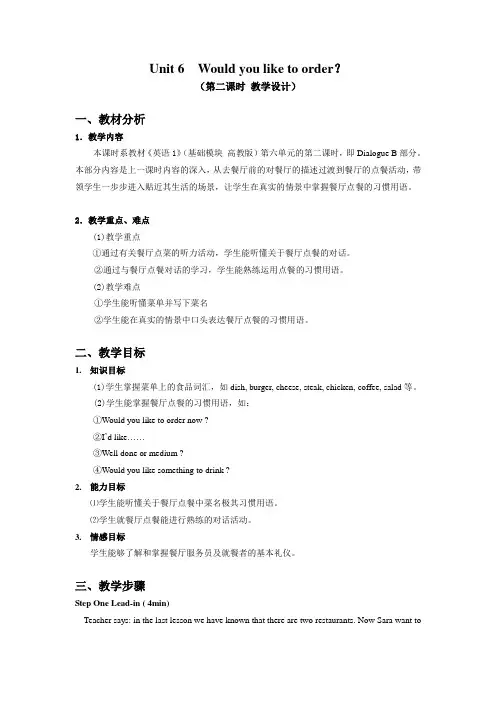
Unit 6 Would you like to order?(第二课时教学设计)一、教材分析1.教学内容本课时系教材《英语1》(基础模块高教版)第六单元的第二课时,即Dialogue B部分。
本部分内容是上一课时内容的深入,从去餐厅前的对餐厅的描述过渡到餐厅的点餐活动,带领学生一步步进入贴近其生活的场景,让学生在真实的情景中掌握餐厅点餐的习惯用语。
2.教学重点、难点(1)教学重点①通过有关餐厅点菜的听力活动,学生能听懂关于餐厅点餐的对话。
②通过与餐厅点餐对话的学习,学生能熟练运用点餐的习惯用语。
(2)教学难点①学生能听懂菜单并写下菜名②学生能在真实的情景中口头表达餐厅点餐的习惯用语。
二、教学目标1.知识目标(1)学生掌握菜单上的食品词汇,如dish, burger, cheese, steak, chicken, coffee, salad等。
(2)学生能掌握餐厅点餐的习惯用语,如:①Would you like to order now ?②I’d like……③Well done or medium ?④Would you like something to drink ?2.能力目标⑴学生能听懂关于餐厅点餐中菜名极其习惯用语。
⑵学生就餐厅点餐能进行熟练的对话活动。
3.情感目标学生能够了解和掌握餐厅服务员及就餐者的基本礼仪。
三、教学步骤Step One Lead-in ( 4min)Teacher says: in the last lesson we have known that there are two restaurants. Now Sara want togo Meiwei Restaurant. Let’s step into Meiwei restaurants with her together to order something to eat or drink today. But do you knowHow should have behavior as a customer?How should a waiter/waitree should behavior?Students work in the groups to discuss to get the right answers to the above two questions.(设计意图: 教师从上一节课内容直接过渡到本节课,开门见山。
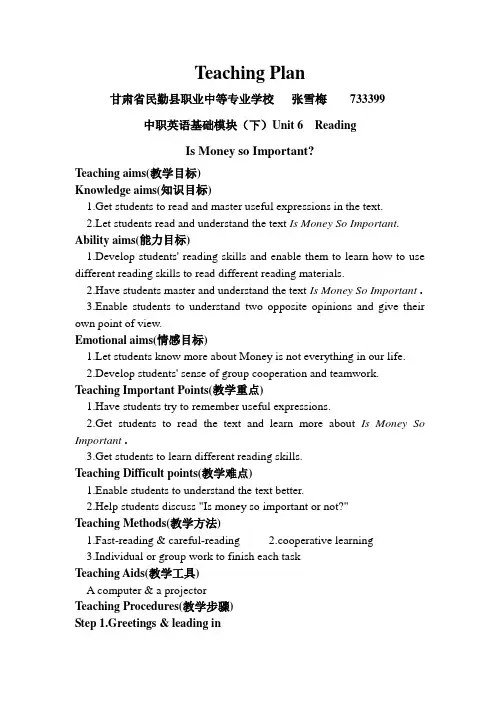
Teaching Plan甘肃省民勤县职业中等专业学校张雪梅733399中职英语基础模块(下)Unit 6 ReadingIs Money so Important?Teaching aims(教学目标)Knowledge aims(知识目标)1.Get students to read and master useful expressions in the text.2.Let students read and understand the text Is Money So Important. Ability aims(能力目标)1.Develop students' reading skills and enable them to learn how to use different reading skills to read different reading materials.2.Have students master and understand the text Is Money So Important.3.Enable students to understand two opposite opinions and give their own point of view.Emotional aims(情感目标)1.Let students know more about Money is not everything in our life.2.Develop students' sense of group cooperation and teamwork. Teaching Important Points(教学重点)1.Have students try to remember useful expressions.2.Get students to read the text and learn more about Is Money So Important.3.Get students to learn different reading skills.Teaching Difficult points(教学难点)1.Enable students to understand the text better.2.Help students discuss "Is money so important or not?"Teaching Methods(教学方法)1.Fast-reading & careful-reading2.cooperative learning3.Individual or group work to finish each taskTeaching Aids(教学工具)A computer & a projectorTeaching Procedures(教学步骤)Step 1.Greetings & leading inSay something about "happiness" and lead in the topic of the reading part.What’s the happiness to you?Different students have different answers: good job, friendship, big house, love, health, money, success,etc.(设计意图:以问题导入,引起学生的兴趣。
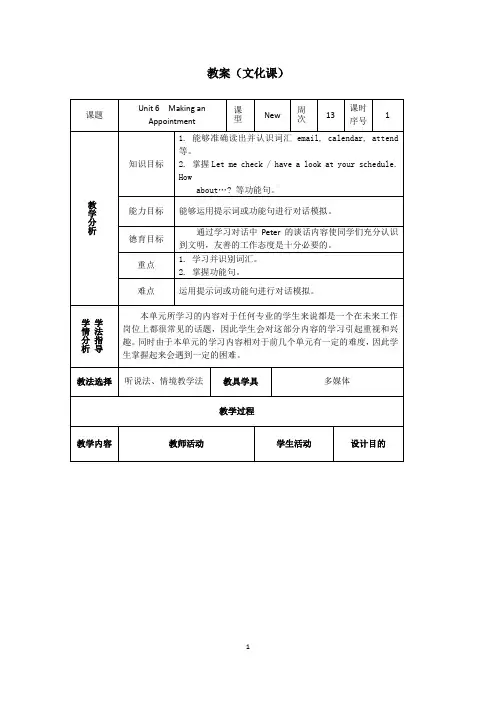
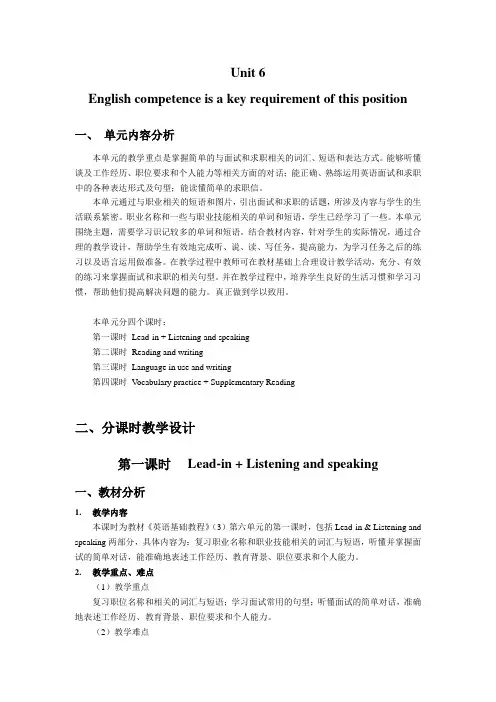
Unit 6English competence is a key requirement of this position 一、单元内容分析本单元的教学重点是掌握简单的与面试和求职相关的词汇、短语和表达方式。
能够听懂谈及工作经历、职位要求和个人能力等相关方面的对话;能正确、熟练运用英语面试和求职中的各种表达形式及句型;能读懂简单的求职信。
本单元通过与职业相关的短语和图片,引出面试和求职的话题,所涉及内容与学生的生活联系紧密。
职业名称和一些与职业技能相关的单词和短语,学生已经学习了一些。
本单元围绕主题,需要学习识记较多的单词和短语。
结合教材内容,针对学生的实际情况,通过合理的教学设计,帮助学生有效地完成听、说、读、写任务,提高能力,为学习任务之后的练习以及语言运用做准备。
在教学过程中教师可在教材基础上合理设计教学活动,充分、有效的练习来掌握面试和求职的相关句型。
并在教学过程中,培养学生良好的生活习惯和学习习惯,帮助他们提高解决问题的能力。
真正做到学以致用。
本单元分四个课时:第一课时Lead-in + Listening and speaking第二课时Reading and writing第三课时Language in use and writing第四课时V ocabulary practice + Supplementary Reading二、分课时教学设计第一课时Lead-in + Listening and speaking一、教材分析1.教学内容本课时为教材《英语基础教程》(3)第六单元的第一课时,包括Lead-in & Listening and speaking两部分,具体内容为:复习职业名称和职业技能相关的词汇与短语,听懂并掌握面试的简单对话,能准确地表述工作经历、教育背景、职位要求和个人能力。
2.教学重点、难点(1)教学重点复习职位名称和相关的词汇与短语;学习面试常用的句型;听懂面试的简单对话,准确地表述工作经历、教育背景、职位要求和个人能力。
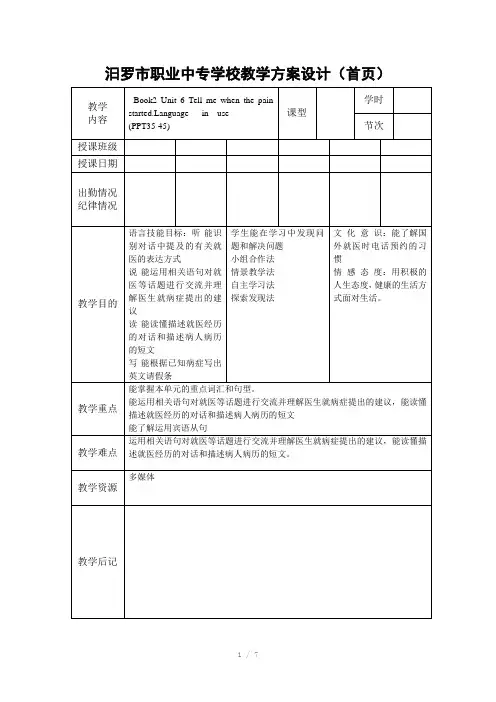
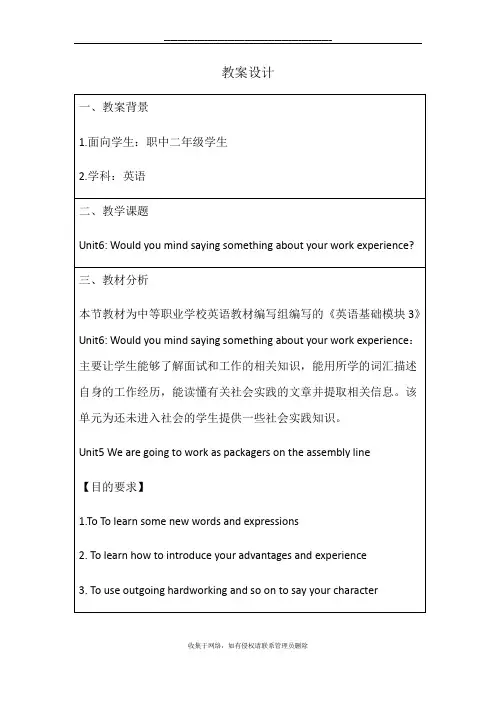
教案设计
、各分公司在接到本工作单之日起,根据配置建议开展参数优化工作,具体要求如下:
一、空闲态驻留策略
UE优先驻留FDD大带宽频点,确保UE能够获得更好的数据业务体验,优先级建议:FDD2.1 = FDD1.8 > FDD800 > TDD2.6 > CDMA
涉及主要参数:
类别功能描述涉及参数参数推荐设置
小区重选L1800/21
00同优先
级重选
小区重选优先级7 异频/异系统测量启动门限(2分贝) 9
最低接收电平(2毫瓦分贝) -64
小区重选迟滞值(分贝) 4
EUTRAN小区重选时间(秒) 1
EUTRAN异频重选时间(秒) 1
L1800到
L800重选
(低优先
级重选)
异频频点小区重选优先级7 异频/异系统测量启动门限(2分贝) 9
服务频点低优先级重选门限(2分贝) 6
异频频点低优先级重选门限(2分贝) 11
小区重选迟滞值(分贝) 5
最低接收电平(2毫瓦分贝) -64。
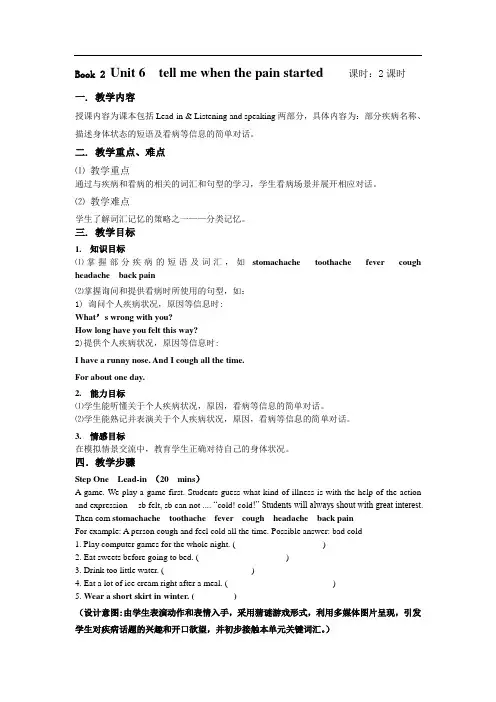
Book 2 Unit 6 tell me when the pain started课时:2课时一. 教学内容授课内容为课本包括Lead-in & Listening and speaking两部分,具体内容为:部分疾病名称、描述身体状态的短语及看病等信息的简单对话。
二. 教学重点、难点⑴ 教学重点通过与疾病和看病的相关的词汇和句型的学习,学生看病场景并展开相应对话。
⑵ 教学难点学生了解词汇记忆的策略之一——分类记忆。
三. 教学目标1.知识目标⑴掌握部分疾病的短语及词汇,如stomachache toothache fever cough headache back pain⑵掌握询问和提供看病时所使用的句型,如:1) 询问个人疾病状况,原因等信息时:What’s wrong with you?How long have you felt this way?2)提供个人疾病状况,原因等信息时:I have a runny nose. And I cough all the time.For about one day.2.能力目标⑴学生能听懂关于个人疾病状况,原因,看病等信息的简单对话。
⑵学生能熟记并表演关于个人疾病状况,原因,看病等信息的简单对话。
3.情感目标在模拟情景交流中,教育学生正确对待自己的身体状况。
四.教学步骤Step One Lead-in (20 mins)A game. We play a game first. Students guess what kind of illness is with the help of the action and expression--- sb felt, sb can not .... “cold! cold!” Students will always shout with great interest. Then com stomachache toothache fever cough headache back painFor example: A person cough and feel cold all the time. Possible answer: bad cold1. Play computer games for the whole night. ( )2. Eat sweets before going to bed. ( )3. Drink too little water. ( )4. Eat a lot of ice cream right after a meal. ( )5. Wear a short skirt in winter. ( )(设计意图:由学生表演动作和表情入手,采用猜谜游戏形式,利用多媒体图片呈现,引发学生对疾病话题的兴趣和开口欲望,并初步接触本单元关键词汇。
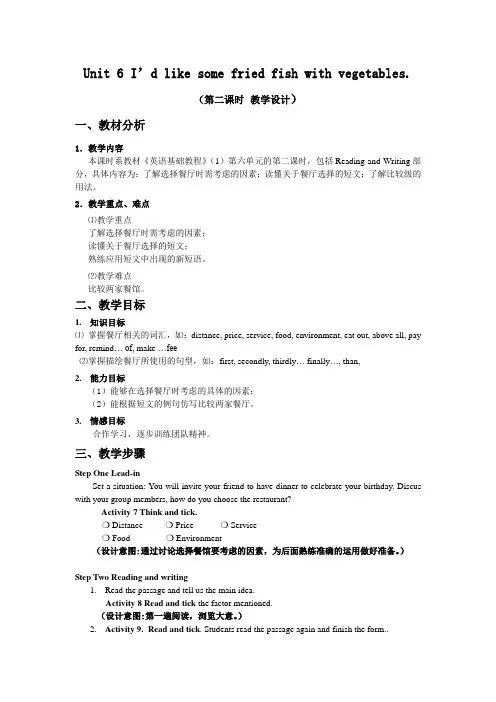
Unit 6 I’d like some fried fish with vegetables.(第二课时教学设计)一、教材分析1.教学内容本课时系教材《英语基础教程》(1)第六单元的第二课时,包括Reading and Writing部分,具体内容为:了解选择餐厅时需考虑的因素;读懂关于餐厅选择的短文;了解比较级的用法。
2.教学重点、难点⑴教学重点了解选择餐厅时需考虑的因素;读懂关于餐厅选择的短文;熟练应用短文中出现的新短语。
⑵教学难点比较两家餐馆。
二、教学目标1.知识目标⑴掌握餐厅相关的词汇,如:distance, price, service, food, environment, eat out, above all, pay for, remind… of, make …fee⑵掌握描绘餐厅所使用的句型,如:first, secondly, thirdly… finally…, than,2.能力目标(1)能够在选择餐厅时考虑的具体的因素;(2)能根据短文的例句仿写比较两家餐厅。
3.情感目标合作学习,逐步训练团队精神。
三、教学步骤Step One Lead-inSet a situation: You will invite your friend to have dinner to celebrate your birthday. Discus with your group members, how do you choose the restaurant?Activity 7 Think and tick.❍ Distance ❍ Price ❍ Service❍ Food ❍ Environment(设计意图:通过讨论选择餐馆要考虑的因素,为后面熟练准确的运用做好准备。
)Step Two Reading and writing1.Read the passage and tell us the main idea.Activity 8 Read and tick the factor mentioned.(设计意图:第一遍阅读,浏览大意。
(总第41-48学1-2学时:Stepl: GreetingsGreet students cheerfully to cheer them up for this English lesson.Step2: Tell students the general arrangements of classroom teaching and learning and their tasks in this class.Step3: teaching the pronouciation of the new words and phrases and give expanlation to them.• 1. earn one, s living=make one, s living 谋生earn money=make money 赚钱• 2. remind sb. of sth.使(人)想起… remind sb. to do sth.3.unless = if ... not除非,如果不e.g. We will go shopping unless it rains. =We will goshopping if it doesn,t rain.4.instead of , instead 代替:反之,e.g. We can usestone instead of wood.It,s too hot. We didn,t goshopping. Instead, we wentswimming.重点:难点:e.g. My book is different from yours. be the same ase.g. My book is the same as yours.6.accept, receive (主观)接受;(客观)收到I received some flowers yesterday. But I didn' taccept them.7.afford to do sth.Can' t afford sth.买不起・a・Can' t afford to do sth e.g. We can' t afford ( to buy) a largehouse.8.be proud of = take pride in 为…而骄傲e.g. We are proud of you.=We take pride in you.9.on earth 到底;究竟e.g. What do you want to do on earth?10.go for a ride (开车)去兜风go for a walkStep4: Do the warming-up part.Show some pictures about money on the ppt for students, and give explanation to some words and phrases:1)Do you think money is important?2)Do you like to wear famous brand clothes?3)What do you think of life, easy or difficult?text.• 1. Why did the son dislike his father and feel unhappy?• 2. Why do young people like to wear famous brand shoes an d clothes?• 3. Can everybody in a country get rich at the same time?• 4. Is it true that all foreigners are rich?• 5. What do you think is most valuable for you?Task2 ScanningRead the text again and then find detailed information.•1.( F)The boy' s father earn much money.•2. ( T ) Young people in Italy like to wear famous brand shoes and clothes.•3. ( F) All the people can become rich at the same time.•4. ( T ) According to the text, we know that life is difficult for most people.•5. (T) Canada is known as a rich and developed country.•6. ( F ) Money is important than anything else.. Task3 Language Points and Sentence Structures1.This reminds me of Italy, when it was still a developingcountry。
Unit 6 Tell me when the pain started.教学设计基本信息章节名称《英语》(基础模块2)Unit 6 Tell me when the pain started (Listening and Speaking) 学科英语授课班级15旅游班授课时数1课时设计者任云雅所属学校汨罗市职业中专学校教材分析本课内容选自高等教育出版社《英语》基础模块2第二版第六单元“Tell me when the pain started”。
该教材是中等职业教育课程改革国家规划新教材,各单元内容充分体现任务性、实践性、应用性等特点,以任务为导向,以活动为依托,以语言为载体,话题贴近生活,设置多个职场环境,体现职业特色。
每个单元都设计有Lead-in,Listening and speaking, self-check, life and culture等8项内容。
修订后的教材内容更精炼,重点更突出,更加注重职场环境中英语语言应用能力的培养。
同时,新版教材设计了全新的版式,情景更真实,教材更美观,使学生们更具学习乐趣。
本单元的任务是掌握有关疾病、健康的常用词语,就病情进行简单描述,电话中预约医生,进行简短对话等。
本单元话题“叙述病症和就医”是《中等职业学校英语教学大纲》涵盖内容,与实际生活紧密结合,容易激发学生的学习热情,调动学生的学习积极性。
本课为本单元的听说环节,重在词汇和句型的应用,为阅读和写作打下基础。
学情分析任教班级为旅游管理专业一年级学生,全班都是女生。
职校学生普遍英语基础较薄弱,英语词汇量有限,学习上缺乏自信心,自主学习能力,理解和分析问题的能力、书面和口头表达能力较欠缺,但旅游专业学生大都属于外向型性格,热情,活泼,喜欢交流,表现欲望强,活动能力、协调能力、交际能力、组织能力、应变能力等方面明显优于其他专业或普高学生,在英语课堂上对感兴趣的活动会积极参与。
另外,班级还有半数学生为对口高考生,学习目标明确,基础较好。
点击职业英语教案教研室:教师姓名:A. Complete the sentences. Use Where is? or Where are? Then answer the questions. Read the instructions and ask students when we use “Where is...” and when we use “Where are...”1. _________________________ the Rocky Mountains? (Colorado) They’re in Colorado.2. _________________________ Orlando? (Florida)3. _________________________ the Lakeside Apartments? (Park Street)4. _________________________ China? (Asia)5. _________________________ Italy? (Europe)6. _________________________ the Empire State Building? (Fifth Avenue)7. _________________________ your house? (street and city)8. _________________________ your school / office? (street and city)Answer key:1. Where are2. Where is3. Where are4. Where is5. Where is6. Where is7. Where is8. Where isB. Listen. What is the person saying: in or on? Check (√) the correct box.Tell students they will listen to eight sentences about different places and need to decideif the speaker says “in” or “on”. Tell them to check the box with “in” or “on”.C. PAIR WORK Look at the maps. Take turns. Ask and answer questions.Have students look at the maps and ask at random “Where’s Tacoma/Chongqing/LongIsland?”, etc. and elicit “It’s in/near...”D. Student A: look at the addresses on the cards and matchbox below.Student B: look at page 175. Ask each other questions to get the information you need to fill in the blanks.Tell students that some of the information is missing (the words in the box) and they need to work with a partner and ask and answer questions to fill in the blanks.Describing specific features of placesA.PAIR WORK Take turns. Ask and answer questions. Use There’s a...or There are a lot of...B.Hollywood has three syllables with the stress on the first syllable:Hol -ly-wood.Listen to these words. Circle the stressed syllable.Tell students to underline or draw a box above the syllable that they think takes moststress or emphasis in each word.Vocabulary in ContextDescribing placesHave students look at the photos, indicate one and introduce the vocabulary by asking “What’s it like?” “It’s...” To reinforce the concept, ask students the places they know that are quiet/ noisy/busy, etc.。
Unit 6 Tell me when the pain started.(第一课时教学设计)一、学情分析本单元是教材《英语2》(基础模块高教版)第六单元,主要话题为看病就医。
教师可通过本单元的听、说、读、写各种教学活动,一方面帮助学生掌握正确表达与英语学习相关的词汇与句型,另一方面引导学生结合自身的情况反思自己的英语学习,针对自身的学习问题选择有效的学习策略。
二、教材分析1. 教学内容具体内容为:有关常见疾病的名称和描述病情的句式、就医时医生和病人之间的有关的对话。
2. 教学重点、难点⑴教学重点能够听懂就医的常用语,能够听懂就医的常用语,掌握叙述病症、掌握叙述病症、接受医生建议的常用表达方式。
⑵教学难点有关就医的词汇和句型。
三、教学目标1.知识目标(1)帮助学生掌握以下词汇:stomachache, toothache, fever,cough, headache, back pain, runny nose, sore throat, appointment等。
等。
)帮助学生掌握就医时使用的基本句型,如:(2)帮助学生掌握就医时使用的基本句型,如:What’s wrong with you?I’ve a headache / a sore throat / a runny nose / fever / cough, ect.How long have you felt this way?I feel cold. I think I have a fever.I’d like to make an appointment with the doctor.The doctor is free at ….Will …be OK for you?…. / YouTake this medicine …times a day. / Stay in bed forshould have a good rest.Thank you very much.四、教学步骤Step One Lead-in (7 mins)1. The teacher greets the Ss with the following sentences:How are you, boys and girls?I didn’t t sleep well last night.I’ve had a cold because ….I’m not myself today.Explain I’m not myself today and get the Ss to say somethingabout themselves.Step Two Listening and speaking (30 mins)1. Before listening, ask the Ss to look at the picture andanswer the question: What’s wrong with the boy in the picture?2. Activity 3: Listen and answer the questions.Listen to the tape and answer the questions. Listen again and then check the answers.3. Activity 4: Listen again and complete the card.4. Activity 5: Read and underline.Read aloud after the tape and then practice the dialogue inpairs. Get some pairs to act it out.Underline the sentences about illness and check in class.Step Three Summary (6 mins)Make a short summary of what we’ve learned today.(1) Useful expressions: have a stomachache / toothache / fever/ cough / headache / back pain / runny nose / sore throat, makean appointment, etc.(2) Everyday English:What’s wrong with you?I’ve a headache / a sore throat / a runny nose / fever / cough, ect.How long have you felt this way?I feel cold. I think I have a fever.I’d like to make an appointment with the doctor.The doctor is free at ….Will …be OK for you?Take this medicine …times a day. / Stay in bed for…. / You should have a good rest.Step Four Homework (2 mins)1. Practice the dialogue in pairs and recite it..2. Make up a dialogue with your partner.五、板书设计have a stomachachetoothachefevercoughheadacheback painrunny nosesore throatmake an appointment I’m not myself today. How havelong have youyou felt this way?I’d like to make an appointment with the doctor.Unit 6 Tell me when the pain started.(第二课时教学设计)一、教材分析1. 教学内容填写病具体内容为:阅读有关描述病人病情的小短文,阅读有关描述病人病情的小短文,填写病人病历,并根据病情编写医生和病人之间的对话;撰写英文病假条。
Unit6 favorite food (The 3rd period--reading)
教学目标:
Train and improve the reading ability of the students
教学重点:
Have the students master some reading skills
教学过程:
一、复习与准备(听写、小组互查)
①重要单词
March may hometown quite field grow turn ......
②重要短语
In the fields come out plant trees be good for come after this time of ye
二、阅读理解
Part1:warming up
1、十二个月份的表达:January(1月) February(2月) March(3月)
April(4月) May(5月) June(6月) July(7月) August(8月) September(9月) October(10月) November(11月) December(12月)
2、季节的表达:spring summer autumn winter
3、星期的表达:Mon.=Monday Tues.=Tuesday Wed.=Wednesday
Thur.=Thursday Fri.=Friday Sat.=Saturday Sun.=Sunday
(Reading skill: 阅读技巧提示)
1、If we meet new words when reading, we can guess the meaning of them in terms of word foot (词根)and context(上下文).
2、we must pay attention to the key words(关键词) in the questions ,and then locate them (定位)in the passage,and then find the best answers.(最佳答案)
Part2:Read the text again and then fill in the blanks
There are twelve months and four________in a year . They are spring、_____、_______、_______.
Many people like spring.Because in spring,everything begins to ____.we usually ______ trees in ______. It also brings _____.Summer is the _____season in a year. It often _____ in summer. So it is a ______ season. Some people also like autumn, Because the weather gets ______and the days get ______. Farmers like it, because of the good_______.
But my favorite season is winter. It ______ a lot and we can go _______ or ________.
Part2:Read the passage and then answer the following questions.
What's your favorite weather? Do you like sunny or rainy days? Many people like sunshine a lot. They don't like rain. They think rain can make them feel sad. During a long holiday, they like going to the beach to enjoy the sunshine. Sunshine can make them feel good and happy. I like sunshine very much, but I also enjoy rain. I enjoy the sound of rain. It can make me feel quiet. On rainy days, I like listening to music and doing some reading, or just looking at the rain and daydreaming. When you daydream, you don't have to think about other things. I think it's a good way to relax when it rains. Sunshine can make one run around and rain can make one quiet, so I hope you can feel happy no matter it rains or shines.
1.Why don't many people like the rain?
Because they think rein can make them feel sad.
2.How do many people feel about sunshine?
Sunshine can make them feel good and happy.
3.How does the writer feel about the rain?
The writer enjoys rain.
4.What does the writer like doing on rainy days?
On rainy days, the writer likes listening to music and doing some reading, or just looking at the rain and daydreaming.
5.The writer suggests (建议)that we should enjoy all weather, doesn't he?
Yes, he does. The writer think that we should feel happy no matter it rains or shines.
Part3:language points of the text
1、Jim is _B__ at all his lessons, And I’m sure he’ll do very _____ in the exams.
A、Well,good
B、good,well
C、well,well
D、good, good
2、In summer,leaves __A__ yellow.
A、turn into
B、turn out
C、turn
D、turn around
3、He ran and ran, but he couldn't run_A__to catch the bus.
A.fast enough
B.quick enough
C.enough fast
D.enough quickly
4、I think I'm__ B__ enough to go to school.
A.good
B.well
C.better
D.best
5、Better__C____ than never.
te
B.the later
ter
D.the late
三、小结及反思。